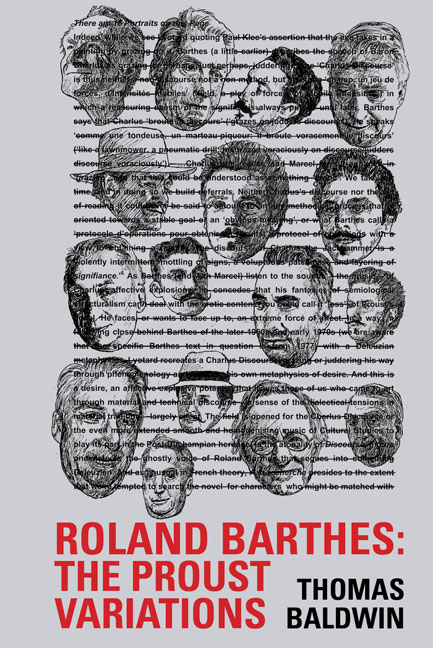1 - Objects
Summary
On a now defunct Wikipedia page, Barthes was included in a list of writers influenced by Proust. The selection criteria for this eclectic set are unclear: it may come as a surprise to some that Proust should be – or have been – thought of as an influence on John Updike and not, for example, on Jean-Paul Sartre. In any case, while Proust is indisputably an important reference in Barthes's oeuvre, and while Wikipedia’s web designers and contributors may continue to believe that lists of who influenced whom are of use, the inclusion of Barthes's name in this hodgepodge of novelists, literary theorists and philosophers was probably more contentious than its author(s) imagined.
Barthes himself was not keen on ‘influence’. In a tetchy interview with Renaud Matignon published in France-Observateur in 1964, he says that he does not believe in influences. Rather than ideas, Barthes declares, it is languages, understood as formal containers that we can ‘fill differently’ (‘des formes que l’on peut remplir différemment’ (II, 616)), that are transmitted between texts. Consequently, and since books are more like ‘currencies’ than ‘forces’, the notion of circulation, he argues, is more accurate than that of ‘influence’. In the course of the same interview, Barthes mentions Proust, among others, in defending himself against Matignon's provocation that his work has had a bothersome, or even impoverishing, influence on certain of his contemporaries:
I would be quite happy to admit to a ‘negative’ influence, because I do not think that a ‘negative’ attitude, as far as literature is concerned, is necessarily an ‘impoverishing’ one; reflecting on the limits, on the detection or on the impossibilities of writing is an essential part of literary creation. For one hundred years, from Mallarmé to Blanchot, important works have been written out of this hollow; even Proust’s work, which seems so positive, so liberating, is born explicitly of a book that is impossible to write. (II, 616)
These remarks echo a number of Barthes's slightly less defensive observations in earlier essays on the negativity of Proust's writing and on the search for an ‘impossible’ literature by which, Barthes contends, modernity is inaugurated.
- Type
- Chapter
- Information
- Roland Barthes: The Proust Variations , pp. 17 - 46Publisher: Liverpool University PressPrint publication year: 2019

